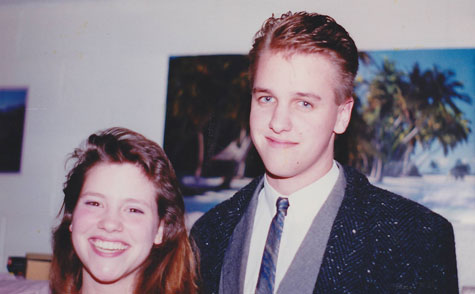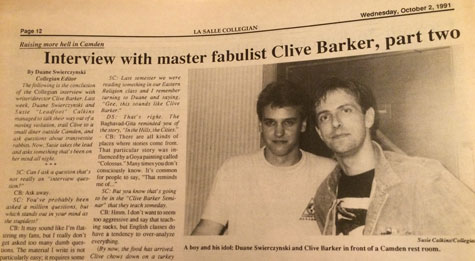
Susanna Calkins, author of A Death Along the River Fleet, and Duane Swierczynski have known each other for a long time. Duane's latest thriller, Canary, has been nominated for an Edgar Award for “Best Novel.” In addition to Susanna's sparkling review of an old friend's work, Ms. Calkins got a chance to sit down with Duane and talk about their time together at La Salle University and its school newspaper, The Collegian, as well as how their education and experiences influenced their writing (including a hilarious account of interviewing Clive Barker—a longtime hero of Duane's).
Read Susanna's review of Canary!
SC: Duane, when you were sitting in our honors classes at La Salle all those years ago, did you ever think that your experiences as a freshman would one day form the backdrop of an Edgar-nominated novel?
DS: I didn’t even know what the Edgars were back then—you might remember that I was a huge horror nerd when we met in September 1989. (I was a year away from discovering crime fiction via the gateway drug of Joe Lansdale’s novels—Cold in July, specifically.) But, I did set a few of my early stories on La Salle’s campus.
There was one called “Alarmed.“ We had a serial fire alarm-puller in the North Dorms, so one night I wrote a story about how the guys on our floor figured out who was responsible, then plied him with booze and set him on fire. (Which was totally a crime story, only I didn’t realize it at the time.) I didn’t publish it anywhere, but I did tape it to my dorm room door. I still have that copy, complete with paint chips from the door still stuck in the tape.
DS: Now let me turn this question back around at you. When we met, were you thinking about writing fiction? Were you secretly writing a novel and never told any of us?
SC: Ha! As a freshman, I remember writing a short story in response to what was supposed to be an essay prompt—our first college assignment. Dr. Butler, our English professor, took me aside and asked me very kindly, “Miss Calkins, do I need to explain what an essay is?”
But yes, I was always secretly writing short stories and starting novels that never went anywhere. Also horror-oriented—Steven King was one of my heroes, too! I only started to write publicly when I joined the staff of the Collegian, and, of course, that was hard-hitting, ripped from the headlines kind of stuff—like new food options in the cafeteria. I think, by then, you were already an editor of sorts.
SC: What made you join the staff of the college paper? Did you envision a career in journalism?
DS: Pretty sure I’ve told you this embarrassing story, but I actually showed up at the Collegian office with clips…and a resume. I may have even worn a tie. The editor-in-chief, Bob Farrace, looked at me with a bemused expression and said, “Um, yeah, okay Skippy—you’re hired.” (The nickname “Skip” stuck with me for longer than I want to remember.)
But, this was all part of my plan. I knew that I couldn’t graduate and hope to write fiction for a living, so I thought that a journalism career would a) beat the bad writing out of my system, and b) keep me in ramen noodles and beer while I wrote short stories and novels on the side.
Joke was on me, though. I turned out to love journalism, too, and spent the next 19 years toiling in the fields of fact.
DC: So what was your Collegian origin story, Susie? What first brought you down to the basement of the Union Building? (I think I may have been your first editor, but then again, I can’t imagine why you’d want to write for a nerd named “Skip.”)
SC: Skip! I forgot about that! I wish I could say that I first walked into the Collegian office out of a deep-seated journalistic pull, but it was actually because one of my good friends had a crush on Bob. While she chatted with him, I looked around the room, recognized a few people—as a commuter, I knew very few people outside of class—and decided to join the staff (no resume needed!). And, yes, you were my first editor!
I really liked writing for Entertainment—reviewing movies, mostly. On occasion, I actually got to interview real celebrities. Of course, there was one interview that stands out among all the others…
SC: How about that time we interviewed Clive Barker? (Well, I just tagged along as photographer, you conducted the interview) What was that experience like for you?
DS: As the kids say these days: I can’t even. I spent my high school years worshipping at the altar of Clive Barker. I picked up his collection In the Flesh (which was actually volume five of his Books of Blood series) and was completely blown away both Barker's writing and his no-holds-barred imagination. It was a lightning bolt moment: here’s what fiction can REALLY do.
So when a former Collegian editor (Mike Sepanic) invited me to hear Barker speak at Rutgers in Camden, New Jersey, nothing was going to hold me back. Except, of course, the lack of a car. Which is how you entered the picture, I believe?
DS: Remind me of how desperate I was when I begged you to drive us to Camden. And, tell everyone about how we almost got arrested.
SC: I had my dad’s ’72 Ford Maverick, and I was ready to take on Camden (which, as you may recall, was the murder capital of the US at the time). We had been invited to join Clive for a bite to eat after his talk, along with some random photographer from another college paper. We three were supposed to follow his car, but Clive’s driver drove so fast, I had to speed to keep them in sight…unfortunately, catching the attention of a Camden cop.
I’ll never forget being pulled over and the cop swinging a flashlight around the car, asking me what I thought I was doing. And, the worst was that Clive Barker kept going—I thought that we had missed our chance!
We all started to explain at once, and then you held up Clive Barker’s book like it was a talisman. “We work for our college paper,” you said, ”and we were trying to catch this author in that car!”
I don’t know if it was the tear in your eye or the catch in your voice, but the cop grinned and said, “Far be it for me to stand between reporters and their story,” and let us go. And, as luck would have it, we had been pulled over right at the diner, and Clive was waiting for us inside…
SC: So go ahead and let your inner fanboy out, Duane. How excited were you to sit down and have a sandwich with your idol? Do you remember what you asked him? And I’m curious, too, as a novelist yourself, what you think when you look back on this experience now. Did you learn anything?
DS: What struck me then—and resonates with me all these years later—was how cool it was that Clive spent so much time with us, a couple of kids from a local Catholic university. The La Salle Collegian wasn’t exactly the New York Times, you know? It was a kindness I’ll never forget, and I try to repay that whenever I can.
Fortunately, I have a tape of the entire interview, and if you remember, we ran a two-part Q&A in the paper. So, I can remember every question and response. What stays with me most, perhaps, is our weird discussion about Japanese pornography…

Okay, I’m (mostly) kidding about that. But, Clive talked to us with a smart, almost giddy enthusiasm that has stayed with me for the past twenty-five years. Yes, it has been almost TWENTY-FIVE YEARS since that encounter.
DS: What do you remember most about it?
SC: Hmmm….the Japanese pornography discussion seems to have been erased from my memory. Mostly, I remember asking him nerdy and inane questions: “Was your writing influenced by the Bhagavad Gita (because it seemed a lot like something we read in our Eastern Religion class)?” and ”Are there any subliminal messages in the covers of your books?”—questions like that.
I think he said, in the nicest way possible, that readers can find anything they want to in a book. But I agree with you, his graciousness with readers has long stayed with me as something to emulate.
And speaking of graciousness, thank YOU Duane for doing this interview with me!
Grab a copy of Duane's Edgar-nominated book, Canary!
opens in a new window![]() opens in a new window
opens in a new window![]() opens in a new window
opens in a new window![]() opens in a new window
opens in a new window![]()
Get Susanna Calkins newest novel, A Death Along the River Fleet!
opens in a new window![]() opens in a new window
opens in a new window![]() opens in a new window
opens in a new window![]() opens in a new window
opens in a new window![]()
Susanna Calkins became fascinated with seventeenth-century England while pursuing her doctorate in British history and uses her fiction to explore this chaotic period. Originally from Philadelphia, Calkins now lives outside of Chicago with her husband and two sons. The Masque of a Murderer is her third novel.
Duane Swierczynski is the Edgar-nominated author of many crime thrillers, including the Shamus Award-winning Charlie Hardie series (Fun & Games, Hell & Gone, Point & Shoot), which was also nominated for the Anthony, the Macavity, and the Barry awards. He's written over 200 comics for Marvel, DC, Dark Horse, Valiant and IDW and currently writes The Black Hood, the first comic in Archie's new Dark Circle imprint. Duane lives in Philadelphia with his wife and children.

Thanks for inviting us do this!